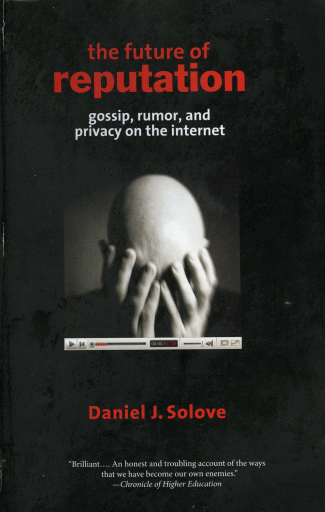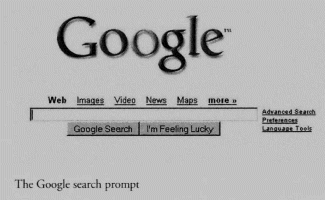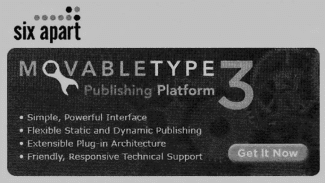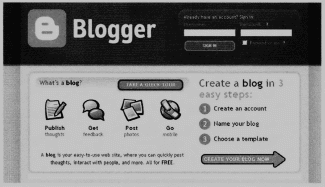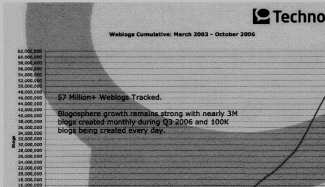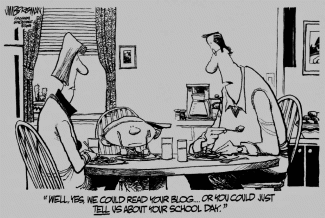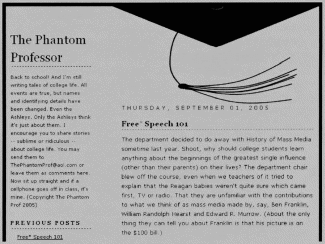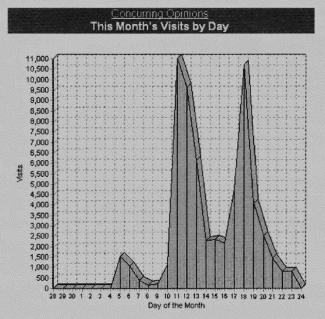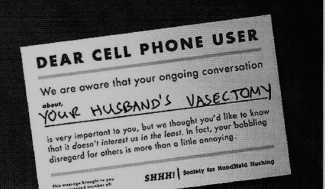PART 2 OF 2
REPUTATIONThe proliferation of personal data on the Internet can have significant effects on people's reputations. As the sociologist Steven Nock defines it, a "reputation" is "a shared, or collective, perception about a person." [74] Our reputations are forged when people make judgments based upon the mosaic of information available about us.
Our reputation is one of our most cherished assets. As the Book of Proverbs states: "A good name is rather to be chosen than great riches." [75] In William Shakespeare's Othello, Cassio, whose reputation is ruined by the evil plotting of Iago, laments: "Reputation, reputation, reputation! O, I have lost my reputation! I have lost the immortal part of my self and what remains is bestial." [76] John Proctor, in Arthur Miller's play The Crucible, refuses to sign a false confession that he engaged in witchcraft, opting instead to be hanged. Similar to Cassio's lament in Othello, Proctor declares: "Because it is my name! Because I cannot have another in my life! Because I lie and sign myself to lies! Because I am not worth the dust on the feet of them that hang! How may I live without my name? I have given you my soul; leave me my name!" [77] Proctor would rather perish than sacrifice his reputation. Proctor recognizes that he cannot function within the community without his good name.
Our reputation is an essential component to our freedom, for without the good opinion of our community, our freedom can become empty. "The desire of the esteem of others," wrote President John Adams, "is as real a want of nature as hunger." [78] The sociologist C. F. Cooley famously pointed out that we form our own selfhood based on how we think others perceive us. Cooley's theory, which he called the "looking glass self," has become widely accepted by social psychologists. [79] Our reputation can be a key dimension of our self, something that affects the very core of our identity. Beyond its internal influence on our self-conception, our reputation affects our ability to engage in basic activities in society. We depend upon others to engage in transactions with us, to employ us, to befriend us, and to listen to us. Without the cooperation of others in society, we often are unable to do what we want to do. Without the respect of others, our actions and accomplishments can lose their purpose and meaning. Without the appropriate reputation, our speech, though free, may fall on deaf ears. Our freedom, in short, depends in part upon how others in society judge us.
Reputation and AccountabilityAlthough we want some degree of control over our own reputation, we also want to know the reputation of others. While privacy gives people greater control over their reputations, it also "makes it difficult to know others' reputations." [80] We have a lot at stake in our relationships with others, and we are vulnerable to great loss if we are let down or betrayed. In many circumstances, we look to people's reputation to decide whether to trust them. As the sociologist Francis Fukuyama defines it, "Trust is the expectation that arises within a community of regular, honest, and cooperative behavior, based on commonly shared norms, on the part of members of that community." [81] Nock observes: "Trust and the ability to take others at their word are basic ingredients in social order. If we never knew who to trust, could never be sure that what we were told was true, or that promises made would be promises kept, there would be little to bind us together or make groups cohesive." [82]
The economist Avner Greif provides a fascinating account of reputation and trust when he discusses the Maghribi traders, a group of Jewish merchants who bartered along the Mediterranean during the eleventh century. [83] To carry out their business, the Maghribi traders depended upon agents to help store, transfer, and sell goods. There was a constant danger, however, of agents embezzling and cheating. Most relationships between agents and traders weren't based on contracts, and the law played virtually no role in regulating their relationships. Nevertheless, the Maghribi traders managed to ensure that agents rarely cheated. The Maghribi simply established a rule that they would never employ an agent who had cheated. A dishonest agent could not move to another trader after cheating a Maghribi trader because information about the agent's untrustworthiness would readily be shared. The Maghribi traders thus used gossip to keep the agents honest. Agents depended upon having a good reputation in order to stay employed, and they knew that if they cheated, they would be held accountable.
Thus, beyond allowing individuals to guard against dealing with dishonest people, reputation also functions to preserve social control. By ensuring that people are accountable for their actions, reputation gives people a strong incentive to conform to social norms and to avoid breaching people's trust.
From the Small Village to the Global VillageIn earlier times, people lived in small villages, and they had firsthand knowledge of one another. All villagers were well known, people's pasts were common knowledge, little was private, gossip spread across the village quickly, and social norms were strongly enforced through shame. People could readily assess one another's reputations.
Today we live in a vast and impersonal society. People are highly mobile. Urbanization and population growth have made communities larger and more diffuse. The sociologist Robert Putnam notes that civic life has been deteriorating -- we're increasingly "bowling alone." [84] People have gradually been withdrawing from involvement in community affairs. In the urban jungle, we are lost amid a sea of unfamiliar faces. We often don't even know many of the people who live on our block, let alone in our building -- or even next door. Studies have pointed out a breakdown in social norms and an increase in rudeness and uncivil behavior. In a 2005 poll, for example, about 70 percent of respondents believed that people are more impolite than a generation ago. [85] Trust is declining. [86] Modern life has made various social ties more diffuse; we interact with many strangers and often lack adequate information to assess their reputations. [87]
Despite these transformations, we have nevertheless found a way to evaluate reputation in contemporary society -- by assembling fragments of personal data. Credit reporting agencies, for example, provide a standardized way to assess our financial reputations. They provide reports to our creditors with an extensive compilation of information about our financial dealings, assets, and transactions. Credit reporting agencies and other companies also provide heaps of data about individuals for employer background checks. As Nock observes, these new reputations "do not depend on a particular locale or group. They follow us as we move and they are accessible when they are needed. They can be altered, or created, in a matter of minutes." [88]
At the dawn of the computer age, Marshall McLuhan predicted that new electronic media would bring the world closer together into a "global village." [89] The Internet is the fulfillment of his prophecy. People scattered across the globe can now all congregate together in cyberspace to share ideas and information. Ironically, the global village leads us toward a future that revives part of the past -- life in the small village of several centuries ago. With the prevalence of cell phone cameras, people can no longer engage in social infractions without risking being caught in the act. No longer can people hide in obscurity and escape accountability for their actions. People can readily document and record each other's norm violations, and they can then post them online.
The global village not only revives features of the small village but also amplifies and alters them in profound ways. The global village is worldwide and it encompasses millions of people. The people of the global village have weak rather than strong ties; they are often known not for their whole selves but for various information fragments others hastily consume.
In the past, oral gossip could tarnish a reputation, but it would fade from memories over time. People could move elsewhere and start anew. The printed word, however, was different. As Judge Benjamin Cardozo wrote in 1931: "What gives the sting to writing is its permanence in form. The spoken word dissolves, but the written one abides and perpetuates the scandal." [90] In the past, people could even escape printed words because most publications would get buried away in the dusty corners of libraries. The information would be hard to retrieve, and a sleuth would have to devote a lot of time to dig it up. The Internet, however, makes gossip a permanent reputational stain, one that never fades. It is available around the world, and with Google it can be readily found in less than a second.
Why Should We Be Able to Control Our Reputations?There's a paradox at the heart of reputation -- despite the fact we talk about reputation as earned and the product of our behavior and character, it is something given to us by others in the community. Reputation is a core component of our identity -- it reflects who we are and shapes how we interact with others -- yet it is not solely our own creation. As one person in the nineteenth century put it: "A man's character is what he is; a man's reputation is what other people may imagine him to be." [91] Our reputation depends upon how other people judge and evaluate us, and this puts us at the mercy of others. Our good reputation can quickly be lost, with deleterious consequences to our friendships, family, jobs, and financial well-being. We must all cope with the fragility of reputation, the delicate porcelain vessel that carries our ability to function in society.
Since reputation plays such a dramatic role in our lives, we naturally desire to have some control over it. As the U.S. Supreme Court has noted: "Society has a pervasive and strong interest in preventing and redressing attacks upon reputation." [92] The law, in fact, allows people to protect their reputations from being sullied by falsehoods. But why? Since reputation is bestowed upon us by others in society and consists of what others think about us, why should we have a right to control it at all?
Under one theory of reputation, the law professor Robert Post observes, it is a form of property. People earn the esteem of others by "the fruit of personal exertion." [93] Indeed, people work hard at building a reputation in society; and it can often be among a person's most valuable assets. One reason to protect reputation, then, is to preserve the years of effort people put into developing it. Another theory of reputation, Post notes, is that we protect it in the name of human dignity. [94] As Post explains, the "dignity that defamation law protects is thus respect (and self-respect) that arises from full membership in society." [95] We protect people from having their reputation unjustly ruined because we respect their dignity.
Another reason to protect reputation is that the stakes are so high. In the past, a false rumor could prove deadly. Between the fourteenth and seventeenth centuries, more than five hundred thousand people were burned in Europe for witchcraft, more than 90 percent of them women. [96] In America the witch trials in Salem, Massachusetts, in 1692 were fueled by rumors and falsehoods. Today reputation still plays an enormous role in our lives, even if not for life-or-death stakes. Our reputation matters quite a lot to us, but it also matters a lot to others in society, who use it to determine whether to trust us. Wrongful and undeserved polluting of a person's reputation not only has devastating consequences for that person, but it also prevents others from accurately judging that person.
A person's reputation is often far from accurate. "Reputation is an idle and false imposition," the villain Iago asserts in Shakespeare's Othello, "oft got without merit and lost without deserving." [97] Indeed, Iago deviously destroys people's reputations, and he recognizes how fragile, manipulable, and inaccurate reputation can be. Good people can have bad reputations and bad people can have good reputations.
When an individual has a better reputation than deserved, it might be the result of essential facts being concealed from the calculus. We're constantly putting on a show for others, trying to hide our warts and present ourselves at our best. Judge Richard Posner contends that privacy allows people to "conceal information about themselves that others might use to their disadvantage." [98] Similarly, the legal scholar Richard Epstein contends that "the plea for privacy is often a plea for the right to misrepresent one's self to the rest of the world." [99] Is there a justification for allowing people to conceal information about themselves that will lower their reputations? It is one thing to ensure that the information factored into the assessment of a person's reputation is truthful; it is quite another to allow people to hide true information that could sully their reputations. Does privacy enable people to be seen in a better light than they deserve? Does privacy undermine our ability to know people for their true selves? We might be entitled to have falsehoods about us cleansed away, but are we entitled to a reputation free from the stain of truths? I will explore these questions in the next chapter.
We can't stop others from judging us, and ultimately, we have only a limited degree of control over our reputations. Once information about us finds its way into the minds of others, we can't control what they think about it. Our ability to exercise control consists of being able to limit the circulation of information about us. The key question is how much control we ought to have over the spread of information about us. We don't want to provide too much control, as this will allow people to trick us into trusting them when they don't deserve it. Too much control will also stifle free speech, as it will prevent others from speaking about us. Hence the conflict: we want information to flow openly, for this is essential to a free society, yet we also want to have some control over the information that circulates about us, for this is essential to our freedom as well.
DUBIOUS DATAAlthough we're getting a lot more good information via the Internet, we're also getting a lot more bad information. On the Internet, we constantly live in a twilight between fact and fiction. We're often exposed to information that we can't entirely trust. In a world where it is difficult to separate the true from the false, rumor and defamation can readily spread, and the Internet can be used as a powerful tool to launch malicious attacks on people and ideas. With modern computer software, anybody can readily create convincing counterfeit images and doctor photographs. Anybody can dexterously concoct fake documents. It is now easier than ever to fabricate and forge.
With the Internet, false information can spread much more rapidly. In 1996 a false rumor about the clothing designer Tommy Hilfiger erupted on the Internet. According to the rumor, Hilfiger said: "If I had known that African- Americans, Hispanics, and Asians would buy my clothes, I would not have made them so nice." The rumor also had Hilfiger confirming on the Oprah Winfrey show that he had made the statement, leading Winfrey to demand that he leave. The rumor sent Hilfiger's company into a tailspin. But Hilfiger hadn't even appeared on Oprah, nor had he made the offensive remarks. Winfrey announced on her show that the rumor "is nor true because it never happened. Tommy Hilfiger never appeared on this show. Read my lips, Tommy Hilfiger has never appeared on this show. All of the people who claim that they saw it, they heard it -- it never happened. I've never even met Tommy Hilfiger." [100]
Katie, an eighteen-year-old who lived in a small town about two hours from Denver, Colorado, learned firsthand the power of false rumors on the Internet. An attractive blonde, Katie was an honor student and prom queen. Like almost everyone else in town, she was shocked when on July 4, 2003, Kobe Bryant was accused of raping a nineteen-year old woman from the same small community. The identity of Bryant's accuser was kept confidential. The mainstream media for the most part kept her identity secret because of a common rule of journalistic ethics nor to reveal the identities of sexual assault victims. But immediately, speculation as to her identity erupted on the Internet. Then Katie became ensnared in the story.
One website named Katie as Bryant's victim. The report, however, was false. Initially, Katie thought it was simply a harmless mix-up. Katie and the victim weren't far apart in age; they went to the same high school; and they lived in the same small town. But Katie didn't realize how fast information moves on the Internet. Within a short time, the information migrated to numerous websites and chatrooms. Her picture was posted around the Internet, emblazoned on one page with the caption "WHORE ALERT." Some websites manipulated images to depict her engaging in sex with Bryant. The Internet cackled with vile and graphic comments about her. Katie said: "It didn't really hit me that hard, just because it was one site .... So I thought, you know, we live in the same town so maybe people just mix up the girls or whatever. But, after a couple of days it wasn't just on one site anymore." [101]
Katie was devastated by the frenzy about her on the Internet. "I was really upset by the whole situation," she lamented. [102] "It's hard knowing that when people think about Kobe's accuser, I'm the face that everyone think[s] of," she remarked in another interview. "I feel violated. I want it to be known that these pictures aren't of the right girl, and I want them removed." Katie's mother was also deeply affected: "I was furious. I'm a helpless mother and my daughter is smeared all over the Internet." Katie's mother contacted many websites asking them to remove Katie's name and photos. Some did, but others didn't. One website owner replied: "In this day [and] age, there is no privacy." [103]
"The fragments of people's lives that emerge on the Internet are somewhat haphazard," one journalist aptly observed. "They can be incomplete, out of context, misleading or simply wrong." [104] In the past, rumors and falsehoods would readily spread around the small village, but the Internet lacks the village's corrective of familiarity. In the small village, people had a long history together and knew the whole story about an individual. But now someone reading an online report about some faraway stranger rarely knows the whole story -- the reader has only fragments of information, and when little is invested in a personal relationship, even information that is incomplete and of dubious veracity might be enough to precipitate ridicule, shunning, and reproach.
The rapid information-spreading power of the Internet can be a virtue too. Judge Richard Posner points out: "The blogosphere as a whole has a better error-correction machinery than the conventional media do. The rapidity with which vast masses of information are pooled and sifted leaves the conventional media in the dust. Not only are there millions of blogs, and thousands of bloggers who specialize, but, what is more, readers post comments that augment the blogs, and the information in those comments, as in the blogs themselves, zips around blogland at the speed of electronic transmission." [105]
Posner is certainly right -- information does speed around the Internet at a breakneck pace. Errors can get corrected quickly. The best thing to do when faced with a malicious rumor is to spread correct information as rapidly as possible.
This works well when we clearly know the truth about something or someone. But what about when we don't? And what happens when facts are posted online that while true, are also of a private nature? With false information, the record can eventually be set straight. But with true information, there's no way to put the secret back in the bag.
THE SOBERING CONSEQUENCESCombine all the information available about people on the Internet-some of it true, some of it false -- with our insatiable curiosity and desire to glean information about others, and some troubling implications emerge. Increasingly, information fragments about people on the Internet are used to make judgments about them.
Employers are looking at social network site profiles of prospective employees. [106] Microsoft officials admit to trolling the Internet for anything they can find out about people they are considering for positions. [107] After a promising interview with a college student for a summer internship position, a company president checked the student's Facebook profile. The student listed his interests as "smokin' blunts" and having a lot of sex. He didn't get the job. [108] Facebook profiles are more restricted than MySpace profiles; access is limited to students. But some employers have kept their accounts after graduating, and other employers have students who work for them check the profiles of prospective employees. [109] Some big corporations are using software to systematically monitor employee blogs. [110]
One young woman was quite surprised when her employer began talking to her about her Friendster profile. [111] But people might never find out if an employer looked at information about them on the Internet. Many employers won't ask a person in a job interview about the story behind his or her half-naked photos on the Internet. Indeed, it can be quite awkward to confront people about the weird things you find out about them online. People just don't get the job or don't even get called in for an interview. The information about a person on the Internet can thus be a secret job killer.
A professor writing under the pseudonym Ivan Tribble notes that before hiring new professors, administrators at his college google each candidate and scrutinize the results: "Our blogger applicants came off reasonably well at the initial interview, but once we hung up the phone and called up their blogs, we got to know 'the real them' -- better than we wanted, enough to conclude we didn't want to know more." Our "quirks," Tribble writes, are best kept hidden, "not laid out in exquisite detail for all the world to read." [112]
To make matters worse, the information that emerges in a Google search of a person's name might not all relate to that person -- it could pertain to other people with the same name. Or it could be spoofed. In one case, students created a fake MySpace profile under their principal's name with pornographic photos and offensive comments. [113]
DoocedOne blogger, Heather Armstrong, achieved fame for being fired from her job because of her blog, Dooce.com. Her firing became so well known throughout the blogosphere that the term dooced was coined to describe losing one's job because of one's online postings. Today her blog is one of the most popular on the Internet, receiving fifty-five thousand visitors per day. [114] She has blogged about her family, her pregnancy, her bouts with severe constipation, and her postpartum depression. [115] But it was blogging about her work experiences which ultimately got her fired. Among other things, she wrote:
I hate that one of the 10 vice-presidents in this 30-person company wasn't born with an "indoor" voice but with a shrill, monotone, speaking-over-a-passing-FI6 outdoor voice. And he loves to hear himself speak, even if just to himself. ... Lately, he's been an authority on patently grotesque facial hair patterns ....
I hate that the Enabling Producer enables nothing but my never-ending agony, that she never knows what she wants and so gives directions as vague as, "Mock up something that, you know, says something," without even telling me what I'm supposed to say something about. [116]
An anonymous person emailed her supervisors about her blog, and they weren't pleased. As Heather wrote about her firing: "Essentially, they explained, they didn't like what I had expressed on my website. I got fired because of dooce.com." Heather tried to defend herself by pointing out she had never mentioned anybody or the company by name, but to no avail. In the end, however, she couldn't quarrel with her firing: "I made my bed; I'll lie in it, to quote the inimitable Courtney Love. I understood the risk when I wrote certain things about certain figures that key members of my company might discover my website and pooh-pooh my endeavors." [117]
But not everybody knows the risks of exposing themselves online. Many individuals are teenagers and college students, who may not consider the consequences. Moreover, many people are not simply self-disclosing in their blogs. Heather's blog contained information about her coworkers, and much of the information people post online involves not just themselves but their friends, teachers, parents, employers, and others. One college professor discovered to her dismay that a student filmed her class and posted it on YouTube, a popular website where people can upload videos and others can watch them for free. [118] In 2006 Google purchased YouTube for $1.65 billion. [119] Anybody can post videos of anybody else on YouTube. People can post pictures of you or write about you in their blogs. Even if you aren't exhibiting your private life online, it may still wind up being exposed by somebody else.
Doing a Background Check on My AdmirerShortly after my book The Digital Person came out in 2004, I received an email from a reader who expressed great admiration for it. The reader, whom I'll call John Doe, said that he was sending copies to a few of his high-powered friends, one of whom was a U.S. senator. Needless to say, I was quite flattered. His email signature indicated he was the "spokesman" for a large data security company.
I emailed him back and thanked him for the praise. We had a number of friendly email exchanges, and he wanted to chat with me on the telephone about various privacy issues. It was at this point that I became interested in finding about more about him and his company. His email signature didn't include a website for his company, so I did a search for it online. I couldn't find an official website for his company. I thought this was quite odd, since most major companies have a website. I then did a search under John Doe's name. Google pulled up some disturbing posts about John in an online discussion group. One member of the group indicated that John had been removed from the discussion list. Among the information I found were these remarks:
One aspect of the John Doe phenomenon is that I have never, ever seen anything -- not a web page, not a news report, not a public filing, not a friend, no nothing -- that suggests anyone's seen anything from John Doe or Doe's company except for email and (sometimes) a voice on the telephone.
In another discussion thread, I found these comments:
This is just a reminder that Doe's company does not exist, that John Doe is not to be taken seriously, and that he speaks only for himself and not for a group of over 100,000 people. Frankly it is sad, and I wish he would get help. Regular readers will ignore his inane ramblings, but new readers may be tricked into replying. Among the "nutsy-cukoo" things he has said in the last few weeks are: That he met personally with President George Bush in Waco Texas and that he is having secret email conversations with government officials. Here is the rest of the FAQ:
Who is John Doe? John Doe has claimed in postings to various lists:
-to be the Chief Executive Officer and the Co-Founder of [a] 4.8 billion dollar privately-held employee-owned company ....
-to be an ex-IBM Fellow,
-to have three degrees, MBA, Masters in Computer Science and Engineering, and Law
-to have served as a judge for 7 years
-to be the author of two books and is working on a third ....
-to have been acting squadron commander of the Marine combat F4 squadron
VMF214 (Black Sheep) at Tan Son Nhut during the Viet Nam war. ...
-Retired Colonel, United States Marine Corps-to own 8% of eBay [120]
The comments went on and on. In some of the material I found on John Doe, there were replies by John. Here's one:
Can you prove any of these statements? I am quite sure you cannot. Please refrain form making false statements in the future.
So here I was, doing a makeshift background check on a person. Online, it's often hard to find out if people are who they say they are. There are many people I know only through email. I read blog posts by pseudonymous authors and reply to comments to my own posts that are by anonymous individuals. A lot of my interactions today are with people I've never seen or heard or met. Having information about others helps us establish trust, especially online, where we often don't meet people in person.
But can we trust the information about people that we find on the Internet? Although John seemed suspicious, the comments about him also seemed to lack credibility. Who goes through all the trouble to discredit a person in a discussion group? Was the poster of these comments about John Doe credible himself? I had to make a judgment, and I didn't trust either John or the antagonist documenting John's purported lies. The easiest thing to do was just to walk away. I ultimately decided not to call John. His background seemed too sketchy. Thus even dubious data about John deterred me from continuing to communicate with him.
Google was a useful tool for me in this situation. I was able to investigate John's reputation, and the information I learned helped me make a decision about whether to talk to him. But this incident made me realize that as strongly as I believe in privacy, the temptation to google people can be irresistible. You can certainly hope that nobody types your name into Google, but that hope is probably futile. At some point in your life, you're probably going to get googled, and the information that pulls up might affect what others think of you.
THERE'S NO GOING BACKOn December 12, 2004, a stocky nineteen-year-old teenager from New Jersey named Gary posted on the Internet a video of himself lip-synching and dancing to "Dragostea Din Tei," a Romanian techno song by the group O-Zone. Gary called his act the "Numa Numa Dance," a name based on some lyrics in the song. [121] As he sat in his chair in front of his computer, Gary danced before his webcam. In a very energetic way, he wiggled back and forth and pumped his arms enthusiastically to the techno beat of the song. The song was extremely catchy, and Gary's movements were quite humorous. He was so passionately engaged in the music that the video had a kind of charm. He submitted his video to a website where users post their videos, which are then made available on the website for anybody to view.
Almost overnight, Gary became a sensation. Soon the video had been downloaded about two million times. Gary appeared on Good Morning America, NBC's Tonight Show, and CNN. His video was shown on VH1. Soon the video had been downloaded more than seven million times. To put this number into perspective, a music CD reaches "platinum" status if it sells more than one million copies, which is a great achievement for any musician.
Then, suddenly, Gary decided that he hated the spotlight. According to a New York Times article ten weeks after Gary had posted the video, he "has now sought refuge from his fame in his family's small house on a gritty street in Saddle Brook. ... According to his relatives, he mopes around the house .... He is distraught, embarrassed." [122]
Can he take it all back? No. There's no going back. Numerous websites now host his video. It is splashed all across the Web. There are Numa Numa Dance parodies. Wikipedia, a free online encyclopedia, has an entry for the Numa Numa dance. There's even a fan website for Gary:
On this site I'll include everything we can find out about our favorite lip-synch icon, including photos, a biography, an annotated list of new videos, fan-created .mp3s, ... movie posters, breaking news, and more!
What Gary did can't be undone. And he was only nineteen years old when he did it. For most of us, the foolish things we do as teenagers disappear into oblivion and are revived only when we reminisce with old friends. But in today's world, foolish deeds are preserved for eternity on the Internet. They become what a person is known for. The world will always remember Gary as the Numa Numa dancer.
Gary's story has a happy ending. He resurfaced in the summer of 2006 with a new slick website designed by a media company and a new music video -- this time professionally produced. [123] Gary appears to have embraced his Internet fame. Many, however, have not.
Little FattyQian was a pudgy sixteen-year-old in China. He was attending a traffic safety class when someone secretly took his photo. His face was round and plump, his cheeks were rosy, his eyes were looking sideways in a skeptical glance, and his small lips were in a pout. The photo began to circulate online, where Chinese Internet users became obsessed with it. People began to use Adobe PhotoShop to place Qian's face on a variety of different images. His face appeared on a variety of movie-poster mock-ups, ranging from the Harry Potter, Austin Powers, and Pirates of the Caribbean series to Brokeback Mountain, The Da Vinci Code, and more. Scores of celebrities were given Qian's digital countenance. He appeared on Buddha images as well as on photos of porn stars. In one image, his visage was carved into Mount Rushmore; in another picture, he was sitting next to President George W. Bush giving him rabbit ears; in yet another, his head was superimposed upon the body of Adam in Michelangelo's Sistine Chapel fresco sequence. And so on. People began to call him Xiao Pang -- "Little Fatty."
One day, somebody told Qian that his photo was all over the Internet. Qian went to a cyber cafe and was stunned to find thousands of websites with his image. At first, Qian was devastated. "When I saw that I was angry and upset," Qian stated in an interview. "It was as if I had been struck by a thunderbolt," he said. "I felt really humiliated. I couldn't bear it and I left [the cyber cafe]."
Soon, Qian's fame began to spread even farther. People began to stop him on the street. At a concert, a group of girls wanted to take a photo with him. Throughout all this, Qian felt embarrassed and ridiculed.
Qian, however, later changed his perspective and began to take the events in stride. "Now my feeling has changed," he said in an interview. "If you always feel depressed, then you feel uncomfortable. Now I can view this event with a calm mind, and I feel released." Moreover, he noted, "I have tried to turn sorrow into strength. At least this makes people smile." He stated that for the most part, he had made peace with his newfound Internet fame: "I like it when they put me on the body of heroes, such as Russell Crowe in Gladiator. But I hate it when they place me on the shoulder of naked women or when the touch-up job is terrible."
 Doctored image of "Little Fatty" (face obscured) next to President George Bush
Doctored image of "Little Fatty" (face obscured) next to President George BushQian is now a star in China, though he still works at a gas station and doesn't make much money from his fame. He appeared on a popular Chinese talk show. And his fans continue to keep track of him. When Qian once mentioned in an interview that he liked the comedian Jim Carrey, people created Little Fatty posters of Carrey's movies. Without even being aware of it, Qian had become an icon throughout China. Fortunately, he made the best of it, but he had little alternative. [124]
The Star Wars KidGhyslain was a stocky fifteen-year-old boy from Canada who was a fan of science fiction. You might already guess that he was classified as a nerd at school and teased. Today, Ghyslain is a worldwide celebrity, known by millions of people in all corners of the globe. Most know him as the "Star Wars Kid," although his full name readily appears on countless websites and news articles.
 Still shot from the Star Wars Kid video (face obscured)
Still shot from the Star Wars Kid video (face obscured)How did Ghyslain transform from a Canadian teenager into the Star Wars Kid? It all happened quite rapidly. In November 2002 he filmed himself at his school video studio pretending to fight an imaginary foe with a golf ball retriever as a light saber. [125] The video lasted about two minutes. Ghyslain twirled around waving the golf ball retriever frantically, making his own sound effects along the way, pretending to be a character from the movie Star Wars: Episode I, The Phantom Menace. [126] The character was Darth Maul, a menacing villain who wielded two light sabers connected at the handles to form a staff. Unlike Darth Maul, whose movements were gracefully choreographed, the Star Wars Kid made jerky and awkward movements, stumbling at some points.
Ghyslain didn't intend the video to be seen by anyone. He left the video on the shelf of the school's TV studio. The video languished there for several months, until April 2003, when another student discovered it. [127] The student shared it with others, and soon they converted it to digital format and posted it on an Internet file-sharing network, where anyone could download it for free. What happened next was amazing. It became an instant hit. Within days, the video was being discussed and posted on numerous websites. Countless people downloaded it.
But that wasn't the end of it. One blogger created an edited version of the video with music and special effects. The edited video began with the traditional Star Wars opening, with text streaming across outer space. The golf ball retriever was illuminated like a light saber, with sound effects added as Ghyslain swung it around. The remix of the video was adeptly done and was quite funny. In a matter of weeks, the original video and the remix were downloaded more than a million times from around the world.
Within no time, websites were barraged by postings making fun of the kid. At Waxy.org, one of the first websites to discuss the story, countless comments were posted. The author of the blog soon stopped allowing comments:
I've turned off new comments in this thread because of the mean-spirited tone, and deleted the most vicious comments. Yes, he's fat and awkward. We get it. Since 90% of the traffic to these videos is coming from gaming, technology, and Star Wars news websites, I'm guessing that most of you weren't any cooler in junior high school than this poor kid. All of you geeks, nerds, and dorks out there need to think twice before trashing one of your own. [128]
The worst comments have been deleted, but here is a taste of what remains:
I don't know which one is funnier, raw or remixed ....
How come this kid is still fat?
If there were more portly Jedis like that, I'd totally leave the dark side.
I dub thee Darth Haul.
Oh my God that is hilarious. I can't breathe!
It's like a bad train wreck ... you don't want to look at it, bur you just can't stop yourself.
Replica Jedi Staff $25; School Camera Rental Fee $5, Video Cassette $3, Making an ass out of yourself and having it spread across the internet ... priceless.
Wow. Simply put, this kid can 1) never live this down 2) never watch any thing [Star wars] related without thinking about his humiliation and 3) never run for president of any country ever. That poor poor boy.
The comments go on and on. One commentator at another website wrote: "The Internet makes fools into stars and stars into fools." [129] Soon the mainstream media found out about the story, and it was written up in numerous newspapers and magazines, including the New York Times. In that story, Ghyslain said: "People were laughing at me .... And it was not funny at all."' [130] Ghyslain transferred to another school. [131] Out of sympathy for Ghyslain's troubles, a blogger collected donations to buy Ghyslain an iPod music player.
The iPod was a small consolation prize for Ghyslain, who was deeply scarred by the incident. Students at his high school would start shouting "Star Wars Kid! Star Wars Kid!" as he walked by. According to Ghyslain, the torment was "simply unbearable, totally. It was impossible to attend class." He dropped out of his high school and had to seek psychiatric care. His family sued the students who placed the video online and the case eventually settled. To this day, Ghyslain has not spoken much about the incident publicly. [132]
Forever, Ghyslain will be known as the Star Wars Kid. There's even an entry under his name in the online encyclopedia Wikipedia. [133] A search under his name or under "Star Wars Kid" pulls up countless hits on Google. Today, according to estimates, the video has become the most watched video on the Internet, having been viewed hundreds of millions of times. [134] Over at a website called The Screaming Pickle, you can watch one of dozens of versions of the video. [135] The website offers up a menu of videos to see:
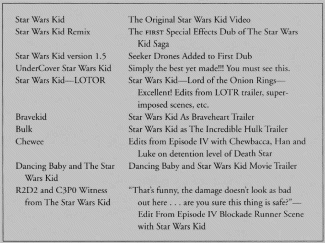

Believe it or not, there's more.
And although it's two years since the original video made its rounds on the Internet, the Star Wars Kid is still a topic of discussion. In 2005 there was an online petition to persuade George Lucas to include the Star Wars Kid In Episode III, Revenge of the Sith:
We the undersigned, urge you to consider Ghyslain A.K.A. "Star Wars Kid" for a cameo in the upcoming Star Wars Episode III movie. [136]
The petition received more than 146,000 signatures, but it was unsuccessful. [137]
And Waxy.org recently posted a tribute to the Star Wars Kid:
It's been almost two years since the Star Wars Kid video, but the tributes keep coming .... Finally, because I get asked occasionally, I have no new Star Wars Kid news. He's never tried to contact me, and I haven't tried to follow up in any way. I don't know the outcome of the lawsuits or what Ghyslain is up to. If anyone out there knows, I'd love to know how he's doing. [138]
Whether you like it or not, whether you intend it or not, the Internet can make you an instant celebrity. You could be the next Star Wars Kid.
THE GOOD AND THE BADWe live in exciting and wondrous times. The Internet and Google bring a library of data into all of our homes. The blogosphere is profoundly democratizing, giving anybody with something interesting to say -- or, for that matter, with anything to say -- a global voice. Blogs and social network websites enable people to express themselves like they've never been able to before. They encourage people to share their lives with strangers, to open up their diaries to the world. As one blogger wrote, blogging allows you "to discover yourself while discovering about other people's [lives]." [139] Blogging allows people to exchange experiences, and it holds out the possibility that many others might find a connection. Blogging represents the very best that communication has to offer. Bloggers who are great writers and storytellers find their calling; some begin writing books. Without blogging, they might never have realized that they had stories or ideas to share. These developments are incredible and dazzling.
But not so good if you're the Star Wars Kid or the dog poop girl. As we charge headfast into the future, as more details about our lives are captured in data fragments, as the blogosphere expands and draws more attention, what are the implications for our privacy? As we move into the future, new technologies of recording sound, images, and tracking people's whereabouts will further enable even more fragments of data about our lives to be captured and potentially disseminated online. In a short essay in the New Republic, Eve Fairbanks writes:
My generation is the first to have grown up with the Internet, and we see the online universe ... as a place where anything goes, where there is neither consequence nor shame, and where concerns about protecting your reputation are less, not more important. Teens blog details, true or made up, about their personal lives that their elders would have blushed to put in their diaries. Parents and teachers ... chalk this up to naivete, suggesting that, when these children grow up, they will be as concerned about privacy as past generations were. But maybe not. [140]
If Fairbanks is correct, then perhaps generations in the future will no longer expect much privacy. One might envision a future where we can finally be uninhibited and honest about ourselves. When everybody's warts are exposed, maybe people will stop readily condemning others, and the social norms that people enforce yet secretly transgress will gradually fade away.
Or not. Maybe the future will be one that is less free, where society is both oppressive and uncontrollable, where people are vulnerable to having their reputations destroyed in an instant, where mistakes in one's past can forever thwart opportunities in one's future.
